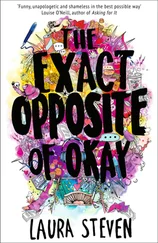I think I see a flash of annoyance cross her face, but then she smiles at me.
“Bathroom?” she asks.
“Follow me.”
I lead her around the corner, then return to my room.
Three days suddenly feels so long. Unfathomable, all the minutes Mabel and I will need to fill. But then I see her scarf on the bed, her hat next to it. I pick them up. They’re even softer than I remembered and they smell like the rosewater Mabel and her mom spray everywhere. On themselves and in their cars. In all the bright rooms of their house.
I hold on to them and keep holding even when I hear Mabel’s footsteps approach. I breathe in the rose, the earthiness of Mabel’s skin, all the hours we spent in her house.
Three days will never be enough.
“I have to call my parents,” Mabel says from the doorway. I set down her things. If she noticed me holding them, she isn’t going to acknowledge it. “I texted them from the airport, but they’re so nervous about this. They kept giving me tips about driving in the snow. I kept saying, ‘I’m not going to be the one driving.’”
She puts her phone to her ear, but even from across the room I can hear when they answer, both Ana’s voice and Javier’s, exuberant and relieved.
The briefest fantasy: Mabel appears at the doorway, catches sight of me. She sits next to me on the bed, takes the hat, and sets it down. Takes the scarf from my hands and wraps it around my neck. Takes my hands and warms them in hers.
“Yes,” she says, “the plane was fine. . . . I don’t know, it was pretty big. . . . No, they didn’t serve food.”
She looks at me.
“Yes,” she says. “Marin’s right here.”
Will they ask to talk to me?
“I have to go check on something,” I tell her. “Say hi for me.”
I slip out the door and down the stairs to the kitchen. I open the refrigerator. Everything is exactly as I left it, neatly labeled and arranged. We could make ravioli and garlic bread, quesadillas with beans and rice on the side, vegetable soup, a spinach salad with dried cranberries and blue cheese, or chili with corn bread.
I spend long enough away that by the time I get back Mabel has hung up.
MAY
I SLEPT THROUGH MY ALARM,woke to Gramps singing to me from the living room. A song about a sailor dreaming, about Marin, his sailor girl. His accent was slight—he’d lived in San Francisco since he was nine—but when he sang, he became unmistakably Irish.
He tapped on my door, sang a verse loudly just outside.
Mine was the front bedroom, overlooking the street, while Gramps occupied two rooms in the back of the house. Between us were the living room and dining room and kitchen, so we could pretty much do whatever we wanted without fear that the other would be listening. He never came into my room; I never went into his. That might sound unfriendly, but it wasn’t. We spent plenty of time together in the in-between rooms, reading on the sofa and the easy chair; playing cards in the dining room; cooking together; eating at the round kitchen table, so small that we never had to ask the other to pass the salt and our knees bumped so often we didn’t bother apologizing. Our hampers were in the hall by the bathroom and we took turns doing laundry, leaving neatly folded stacks on the dining room table for the other to take whenever the time was right. Maybe parents or spouses would have taken the clothes and opened up the other one’s drawers, but we were not father and daughter. We were not spouses. And in our house, we enjoyed our togetherness but we enjoyed our apartness, too.
His song trailed off as I opened my door to his wide-knuckled, age-spotted hand, holding out coffee in the yellow mug. “You’ll need a ride today. And from the looks of you, you’ll need this coffee.” Yellow morning light, beating through the curtains. Blond hair in my eyes until I pushed it away.
A few minutes later we were in the car. The news was all about a prisoner of war who had been brought back, and Gramps kept saying, “What a shame. Such a young boy,” and I was glad he had something to engage himself because I was thinking about last night.
About Mabel and all of our other friends, cross-legged in the sand, part shadowed, part lit in the bonfire glow. It was May already. We’d all be leaving one another, going to other places in the fall; and now that the season was changing, rushing toward graduation, everything we did felt like a long good-bye or a premature reunion. We were nostalgic for a time that wasn’t yet over.
“So young,” Gramps was saying. “To endure a thing like that. And people can be so heartless.”
He set his blinker on as we approached the drop-off zone at Convent. I held my coffee cup out so it wouldn’t slosh as he turned.
“Look at that,” he said, pointing at the dashboard clock. “Two minutes to spare.”
“You’re my hero,” I told him.
“You be good,” he said. “And careful—don’t let the sisters know we’re heathens.”
He grinned. I took my last sips.
“I won’t.”
“Take an extra helping of the blood of Christ for me, will you?”
I rolled my eyes, set my empty mug on the seat.
I shut the door and leaned down to wave at him, still delighted by his own jokes, through the rolled-up window. He made his face fake-somber and crossed himself before laughing and driving away.
In English, we were talking about ghosts. About whether they were there at all, and if they were, whether they were as evil as the governess in The Turn of the Screw thought.
“Here are two statements,” Sister Josephine said. “One: The governess is hallucinating. Two: The ghosts are real.” She turned and wrote both on the board. “Find evidence in the novel for both of these. Tomorrow, we’ll discuss as a class.”
My hand shot up. “I have a third idea.”
“Oh?”
“The staff is conspiring against her. An elaborate trick.”
Sister Josephine smiled. “Intriguing theory.”
Mabel said, “It’s complicated enough with two,” and a few other people agreed with her.
“It’s better if it’s complicated,” I said.
Mabel turned in her desk to face me. “Wait. Excuse me? It’s better if it’s complicated? ”
“Of course it is! It’s the point of the novel. We can search for the truth, we can convince ourselves of whatever we want to believe, but we’ll never actually know. I guarantee that we can find evidence to argue that the staff is playing a trick on the governess.”
Sister Josephine said, “I’ll add it to the list.”
After school, Mabel and I split up our science assignment on the 31, hopped off around the corner from Trouble Coffee, and went in to celebrate our excellent time management with two cappuccinos.
“I keep thinking about ghosts,” I said as we walked alongside the pastel houses with flat facades and square windows. “They show up in all my favorite books.”
“Final essay topic?”
I nodded. “But I have to figure out a thesis.”
“The only thing I like about The Turn of the Screw is the governess’s first sentence.” Mabel paused to tug on her sandal strap.
I closed my eyes and felt the sun on my face. I said, “‘I remember the whole beginning as a succession of flights and drops, a little seesaw of the right throbs and the wrong.’”
Читать дальше













